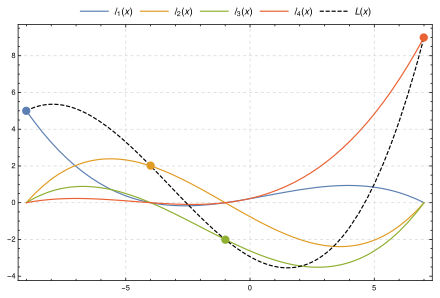In many scenarios, an efficient and convenient polynomial interpolation is a linear combination of the given values, using previously known coefficients.
• 729 Downloads • Abstract This paper deals with the multi-choice transportation problem (TP) in which the parameters of the TP such as the cost coefficients of the objective function, supplies and demands of the constraints are all followed multi-choice parameters. The main aim of this paper is to select an appropriate choice from the multi-choices for the cost coefficients of the objective function, supplies and demands of the constraints in TP by introducing Lagrange’s interpolating polynomial in such a way that the total cost is minimum. Finally, a non-linear mathematical model has been formulated. Using LINGO software, the optimal solution of the proposed problem is obtained.

A real-life problem on multi-choice TP is considered to illustrate the proposed method in this paper. A petroleum refinery company acts as a leader in the petroleum refinery and marketing sector.
The company processes crude oil to produce petroleum products such as petrol, diesel, LPG and kerosene. The company has three storage terminals (here three supplies in terms of TP) and four depots (here four destinations in terms of TP) in a particular region. The company transports refined oil from the storage terminals to depots via tankers over the highways and railways. The transportation cost (in Rupees) for one unit (one gallon ) of refined oil, each treated as of multi-choice parameter. This happens for different uncountable factors such as toll tax, fluctuation of fuel price etc. Due to these factors, assuming that the cost coefficients of TP follow multi-choice parameters (i.e, there are various routes are available from sources to destinations) and the cost matrix of the TP is defined as follows.
The aim of this paper is to discuss the solution procedure for multi-choice transportation problem with the consideration of all the parameters which are multi-choice types. Most of the real-life transportation problems, the cost coefficients of the objective function, supply and demand parameters may not be known previously due to uncountable factors.

Due to this reason, the cost coefficients of the objective function, supply and demand parameters are multi-choices rather than single choice and keeping in view of all these factors, multi-choice transportation model has been formulated. In mathematical programming, there is no direct methodology to handle the multi-choice parameters. For the first time, and in this paper, Lagrange’s interpolating polynomial is used to handle the multi-choice parameters of TP. Here, the following are the main advantages when Lagrange’s interpolating polynomial is used to solve multi-choice transportation problem. • Computation burden is less. • The size of the problem is not increased due to absent of auxiliary constraints.
• Any number of choices for goal can be accommodated. Download software aplikasi android. Finally, the proposed model is highly applicable for solving the real-life transportation problem and by following this model, the decision maker will be more benefitted to take right decision for giving more information. In future study, the presented methodology of this paper can be extended to multi-objective interval valued multi-choice transportation problem and this methodology may be useful to extract better solution of decision making problems in supply chain management.
Hum 1991 video songs free download. Jumma and Tiger promise to reunite in the future.